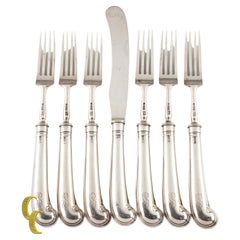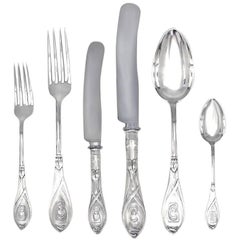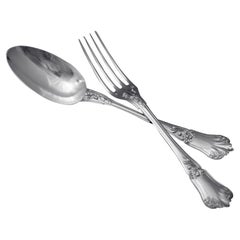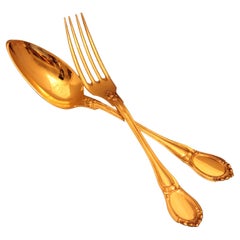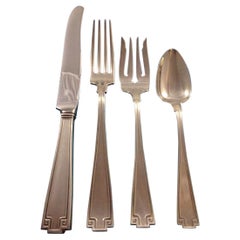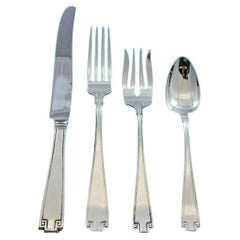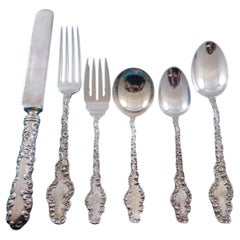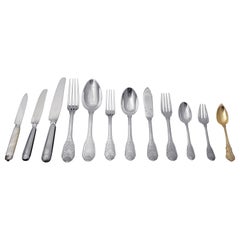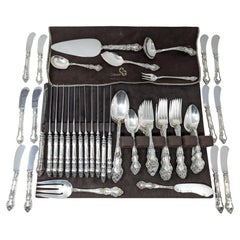Antique Flatware Sets
Early 20th Century British Victorian Antique Flatware Sets
Sterling Silver
Early 20th Century German Jugendstil Antique Flatware Sets
Sterling Silver
Late 19th Century French Louis XV Antique Flatware Sets
Sterling Silver
Mid-19th Century French Louis XVI Antique Flatware Sets
Vermeil, Sterling Silver
Early 20th Century Antique Flatware Sets
Sterling Silver
Early 20th Century Antique Flatware Sets
Sterling Silver
Late 19th Century Antique Flatware Sets
Sterling Silver
Late 19th Century European Louis XVI Antique Flatware Sets
Sterling Silver
Early 20th Century American Other Antique Flatware Sets
Sterling Silver
Early 20th Century Antique Flatware Sets
Sterling Silver
Early 20th Century Antique Flatware Sets
Sterling Silver
Early 20th Century Antique Flatware Sets
Sterling Silver
1920s American Louis XIV Antique Flatware Sets
Sterling Silver
1890s French Louis XVI Antique Flatware Sets
Sterling Silver
Early 19th Century Chinese Antique Flatware Sets
Silver, Gilt Metal
Early 20th Century Antique Flatware Sets
Sterling Silver
Early 20th Century Antique Flatware Sets
Sterling Silver
Late 19th Century French Louis XVI Antique Flatware Sets
Sterling Silver
Early 1900s American Antique Flatware Sets
Sterling Silver
Early 20th Century Antique Flatware Sets
Sterling Silver
Late 19th Century French Antique Flatware Sets
Sterling Silver
Early 20th Century Antique Flatware Sets
Sterling Silver
Late 19th Century Antique Flatware Sets
Sterling Silver
Early 1900s American Antique Flatware Sets
Sterling Silver
Late 19th Century French Louis XVI Antique Flatware Sets
Sterling Silver
Early 1900s Antique Flatware Sets
Sterling Silver
Early 20th Century Antique Flatware Sets
Sterling Silver
Late 19th Century French Louis XVI Antique Flatware Sets
Vermeil, Sterling Silver
Late 19th Century French Antique Flatware Sets
Sterling Silver
1870s Antique Flatware Sets
Sterling Silver
Late 19th Century Antique Flatware Sets
Sterling Silver
Late 19th Century Antique Flatware Sets
Sterling Silver
Late 19th Century French Antique Flatware Sets
Sterling Silver
Early 20th Century Antique Flatware Sets
Sterling Silver
Late 19th Century Antique Flatware Sets
Sterling Silver
Early 1900s Antique Flatware Sets
Sterling Silver
Late 19th Century Antique Flatware Sets
Sterling Silver
Early 20th Century Antique Flatware Sets
Sterling Silver
1910s Antique Flatware Sets
Sterling Silver
1850s English Early Victorian Antique Flatware Sets
Silver Plate
1910s American Arts and Crafts Antique Flatware Sets
Sterling Silver
1920s Antique Flatware Sets
Sterling Silver
1920s American Antique Flatware Sets
Sterling Silver
1890s Antique Flatware Sets
Sterling Silver
1920s American Louis XIV Antique Flatware Sets
Sterling Silver
Late 19th Century French Antique Flatware Sets
Sterling Silver
1910s Arts and Crafts Antique Flatware Sets
Sterling Silver
Early 1900s American Art Nouveau Antique Flatware Sets
Sterling Silver
Early 20th Century Antique Flatware Sets
Sterling Silver
19th Century Antique Flatware Sets
Sterling Silver
Early 20th Century Antique Flatware Sets
Sterling Silver
Late 19th Century French Louis XVI Antique Flatware Sets
Vermeil, Sterling Silver
Mid-19th Century Antique Flatware Sets
Sterling Silver
1920s American Louis XIV Antique Flatware Sets
Sterling Silver
Early 20th Century Antique Flatware Sets
Silver Plate
Early 1900s American Antique Flatware Sets
Sterling Silver
1850s Antique Flatware Sets
Sterling Silver
Early 20th Century Antique Flatware Sets
Sterling Silver
Early 1900s American Antique Flatware Sets
Sterling Silver
1880s Antique Flatware Sets
Sterling Silver
- 1
- ...
Antique Flatware Sets For Sale on 1stDibs
How Much are Antique Flatware Sets?
- 1stDibs ExpertNovember 5, 2024To identify an antique tea set, look closely to determine who the manufacturer is. Locate the hallmark on the bottom of a saucer, teapot or cup. A maker’s mark on one of these items is the best indicator of the set’s origin. If you snap a photo with your smartphone or tablet, you can conduct a reverse image search to jump-start your research. Professionals recommend consulting auction catalogs, books and trusted online resources such as museum exhibition materials. With some research, you may be able to match the marking to the manufacturer's name and, from there, identify the pattern and age.
In 17th-century England, Chinese tea began to arrive at ports in London. Mass production of porcelain tea sets took place in the 18th century, and during the early 1800s, tea became widely affordable, and the concept of teatime took shape all over England.
Reputable soft-paste porcelain makers include Sèvres, Capodimonte and Chelsea, while Meissen was the first European maker of hard-paste porcelain. Bone china manufactories of note include Spode, Minton and Derby, which was later called the Royal Crown Derby Porcelain Company.
Generally, a tea set is considered vintage if it’s at least 20 years old, while antiques are at least 100 years old. Although a maker’s mark is generally a helpful indicator of a given manufacturer, forgeries have occurred over the years. Look for other signifiers of a material, time period or style if you are uncertain of your piece’s origin. For help with identification, seek out a certified appraiser or knowledgeable antique dealer.
Find antique tea sets on 1stDibs.
